Photographs: Reuters Veenu Sandhu
Eighty kilometres from Ajmer in Rajasthan, on a hillock overlooking the village below, stands the five-storey Badnor Fort.
Flanked by lakes Vinod Sagar and Akshay Sagar, the 500-year-old fort is up for grabs. The government of Rajasthan is ready to offer the 4.5-acre site on a 60-year lease for a 60- to 65-room heritage hotel to the highest bidder.
A few hours' drive from here lies Sarwar Fort, once a heavily fortified structure with a single entrance and a moat that runs around it. Built in the late 17th or early 18th century, this one is also on the block.
There's more available elsewhere in the state. In Udaipur, a private haveli-turned-heritage hotel is up for sale for Rs 6 crore (Rs 60 million).
. . .
Want to buy a fort? Hundreds on sale in India
Image: Rajasthan has many forts and havelis that are for sale.Photographs: Courtesy, Rajasthan Tourism
In Nagore, an old fort with 35 rooms is on sale for Rs 5 crore (Rs 50 million). In Bundi, a 125-room fort can be bought for Rs 14 crore (Rs 140 million).
A 150-year-old village castle in Barmer with private stables and temples is available on a 15-year lease for Rs 5 lakh (Rs 500,000) a year.
Across Rajasthan, formed by the merger of 22 princely states after Independence, over a hundred forts, and hundreds of old havelis, have been put up for sale, lease or partnership by the government as well as private owners.
The prices range from as little as Rs 1 lakh (Rs 100,000) for a dilapidated haveli to Rs 35 crore (Rs 350 million) for a functional heritage hotel.
. . .
Want to buy a fort? Hundreds on sale in India
Image: Nalagarh Fort.Rajasthan isn't alone. "In Uttar Pradesh, there are four or five forts-cum-havelis in Bijnor and Bulandshahr which their owners want to lease out," says Vikramjeet Singh, who owns Kuchesar Mud Fort in Bulandshahr, which his forefathers built in 1734. It was converted into a heritage hotel in 1998.
Up in the hills of Himachal Pradesh, 10 or 12 forts and many more havelis are looking for buyers. "There are forts in and around Solan, Shimla, Sirmour, Kangra and Una, but only a handful of these have so far been converted into heritage hotels," says Vijayendra Singh, whose ancestors built Nalagarh Fort in 1421, which he converted into a hotel 15 years ago.
Recently, descendants of the former royals of Gujarat met to explore the possibilities of converting their palaces and forts into heritage hotels.
Several of them are keen on developing these ancient properties -- there are about 300 across the state -- in partnership with top hoteliers.
. . .
Want to buy a fort? Hundreds on sale in India
Image: Aman Nath of Neemrana Hotels.Hoteliers know there's an opportunity here. WelcomHeritage, the equal joint venture between ITC and the former royal family of Jodhpur, operates more than 50 such hotels.
The supply has been good enough for the company to put together 'circuits' of heritage properties in Himachal Pradesh and Rajasthan.
Aman Nath and Francis Wacziarg of Neemrana Hotels have done 24 heritage properties so far. The Indian Heritage Hotels Association, based in Jaipur, has 160 members across the country.
. . .
Want to buy a fort? Hundreds on sale in India
Image: Shiv Niwas Palace in Udaipur.The business logic is simple. Foreigners love the heritage experience. The improvement in air connectivity and the road network has made Indian customers also look at such experiences with new interest.
Unlike modern hotels, these forts and havelis sell not just the hotel experience but also local food, art and life.
At the top end of the heritage market are Falaknuma Palace in Hyderabad, Ram Bagh Palace in Jaipur, Umaid Bhawan Palace in Jodhpur and Shiv Niwas Palace in Udaipur.
Rooms here can cost up to Rs 25,000 a day. Most other heritage properties operate at Rs 3,500-8,000 a day.
. . .
Want to buy a fort? Hundreds on sale in India
Image: Badnor Fort.Acquiring a fort or haveli costs less than a three-bedroom flat in upscale Delhi or Mumbai. Getting the property in shape is what drains the coffers.
"These properties are hundreds of years old. At a rough estimate, restoring and renovating each room would require up to Rs 50 lakh (Rs 5 millon)," says an official involved with the Rajasthan government's initiative to lease out the forts at Badnor, Sarwar and Shahbad.
"A conservation architect will have to be engaged to test each crack, each slab and the thickness and quality of each wall. Bathrooms will have to be added to each room. The process takes at least two or three years."
. . .
Want to buy a fort? Hundreds on sale in India
Image: Falaknuma Palace in Hyderabad.S C Sekhar, senior executive vice president of ITC's hotels division, reckons a dilapidated fort takes five years to restore, while an in-use fort can be done in half the time. Restoration experts can charge from 0.5 per cent to 8 per cent of the total budget.
The restoration of the Falaknuma Palace took Indian Hotels Company close to 10 years and cost over Rs 1 crore (Rs 10 million) per room!
The scale of the work can be daunting. Jal Mahal Resorts has signed a 99-year lease of Rs 2.5 crore (Rs 25 million) per year (15 per cent annual increase) with the Rajasthan government to develop 100 acres around Jal Mahal in Jaipur -- hotels, parks, et cetera.
. . .
Want to buy a fort? Hundreds on sale in India
Image: Jal Mahal.In the last three years, it has spent Rs 65 crore (Rs 650 million) on restoring the Jal Mahal monument alone and the lake in which it is situated. The capacity of the lake has been increased and a drainage line and treatment plant set up.
What was once a stinking nullah is now a pristine water body that leads to a revitalised Jal Mahal which will open to public for the first time in history in the next few days.
It's not a seller's market. Last year, Rajasthan had wanted to lease out Badnor Fort for Rs 50 lakh a year. But converting it into a hotel would need at least Rs 30 crore (Rs 300 million).
. . .
Want to buy a fort? Hundreds on sale in India
Image: Falaknuma Palace in Hyderabad.So, despite the government's friendly schemes -- 100 per cent exemption from charges to convert a heritage property into a hotel with at least 10 rooms, loan at easy interest and 75 per cent concession in stamp duty -- not one bidder turned up.
Upendra Singh of Rajasthan Tourism admits there are complications. "There are encroachers in some forts and fortresses," he says, "but the government will deal with that and hand out clean properties."
Not everybody is convinced that the forts will find takers even after the renewed effort. "These are nazool properties which the government acquired when the princely states were abolished," says Ranvir Singh, Rajasthan Convenor of the Indian National Trust for Art and Cultural Heritage.
"The state didn't know what to do with them. Some were given to the education department for schools. Another had a police station operating out of it. Vandals and thieves have ripped out the jaalis, kewads [ornate doors] and marble."
. . .
Want to buy a fort? Hundreds on sale in India
So far, the only nazool property Rajasthan has had luck with is the two-century-old Tijara Fort which once belonged to the rulers of Alwar.
"We had seen the incomplete ruins of Tijara some 18 years ago," says Aman Nath.
"Though we won the bid [for a 60-year lease], it took three governments seven years to hand it over to us [in July 2009]! Developing Tijara was meant to be a public-private partnership, but it's more like a private party's problem," he says, punning on 'PPP'.
Nath and Wacziarg hope to have the first wing of the fort functional by November. They have not engaged any conservation architect. "We had written on the architecture and building traditions of Rajasthan and worked with masons who were Kumawats. Building was their hereditary tradition," Nath says.
. . .
Want to buy a fort? Hundreds on sale in India
The abundant supply has made hoteliers choosy about what they buy. IHHR Hospitality was on the lookout for property in a quiet place, close to a spiritual centre.
Gautam and Ashok Khanna, the father-son promoter duo, after scouting around for a long time, saw the palace of the former royal family of Tehri Garhwal above Hardwar.
The fort was built by Manumendra Shah in 1885 and expanded in 1910 when it hosted the Viceroy, Lord Linlithgow. It was the summer resort of the Shahs. (The priests of Badrinath come here every spring before opening the temple to seek their consent.)
It was not on the market, but the Khannas persuaded the Shah family to part with a part of the estate and the palace. They opened a spa there. Thus was born Ananda in the Himalayas.
. . .
Want to buy a fort? Hundreds on sale in India
Image: Falaknuma Palace in Hyderabad.Though the Khannas frequently get offers, they haven't taken up any other heritage project so far.
"Not every fort, palace or haveli should be converted into a heritage hotel. Its location and accessibility are critical for it to be viable," says Arvind Singh Mewar, chairman and managing director of the Udaipur-based HRH Group of Hotels.
"Besides, a heritage hotel cannot be run in isolation. The energy of the owner has to be brought into play. The guests expect it to be more than a five-star hotel. They are looking for an insight into the lives of the people who own the place, their food, culture and traditions." He wants to expand the existing 30-50 room inventory to 70-80 rooms to make it more viable.
With hoteliers acting pricey, private owners of forts, fortresses, castles and havelis, too, have gone out in search of investors.
. . .
Want to buy a fort? Hundreds on sale in India
Image: Hotel Castle Mandawa."But many such properties are under litigation from the various claimants," says Raghuveer Singh Solanki of real estate firm Proud India Heritage.
Often deals fall through if even one of the many owners objects. A mutually acceptable deal is also not easy. "When the owner himself converts the property into a heritage hotel, it is more viable," says Randhir Vikram Singh, owner of Hotel Castle Mandawa in Rajasthan's Shekhawati area.
"We started with six rooms in 1980. Now we have 82 rooms and a staff of 120." Singh is also the general secretary of Heritage Hotels Association and a ninth-generation descendant of the family that built the castle.
Maintenance is high and never-ending. "In some places the walls are 10 ft thick. Stopping seepage alone can cost a fortune," he adds.
. . .
Want to buy a fort? Hundreds on sale in India
Image: Kuchesar Mud Fort.Unlike a modern hotel, where 60 per cent of the revenue is from room rent and the rest from food, "in a heritage hotel like mine, most of the revenue comes from room rent [Rs 5,000-8,300]," says Vikramjeet Singh of Kuchesar Mud Fort.
For Nalagarh Fort, it's 50:50. "We grow vegetables on over 40 acres. Banquets and conferences are often held at the fort, which is close to Chandigarh and on the Delhi-Manali route," says owner Vijayendra Singh. Room occupancy throughout the year is 50 per cent. "We break even at 20 per cent," he claims.
The loan he took to convert the fort into a heritage hotel was settled in about seven years and now it's a debt-free run for him.
But then, Kuchesar Mud Fort, Nalagarh Fort and Castle Mandawa have always been inhabited, unlike the many forts scattered across Rajasthan waiting for someone to restore them to their lost glory.

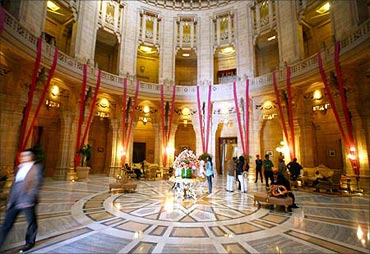
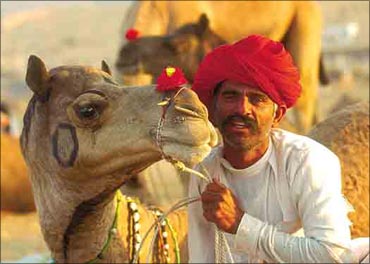
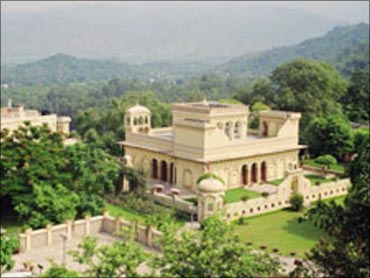
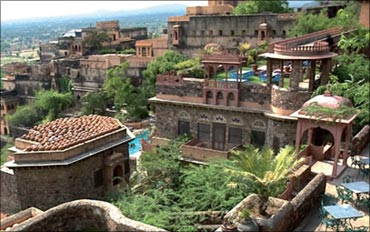

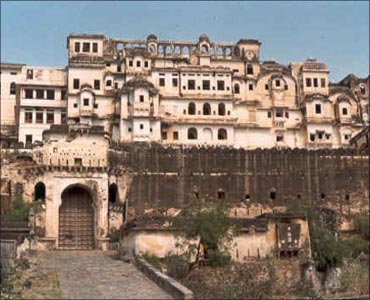
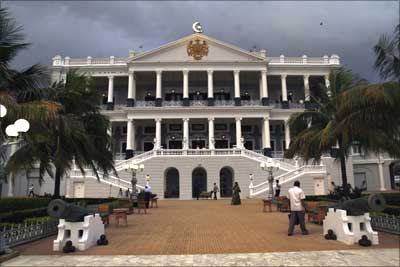
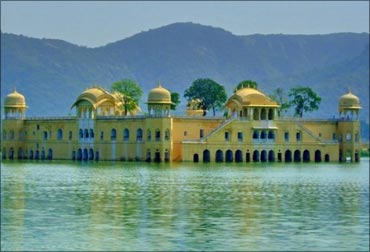
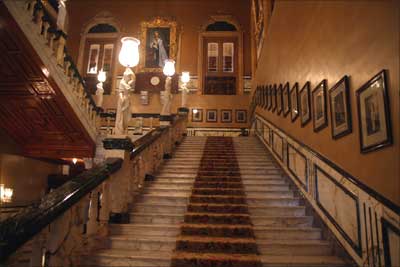
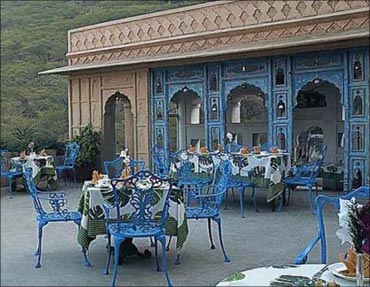
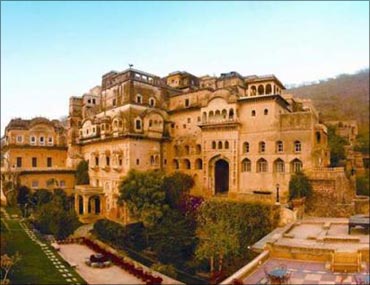
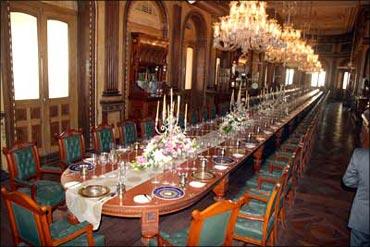
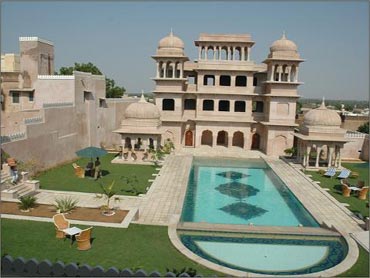
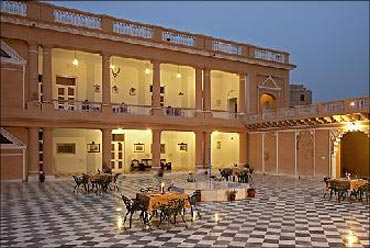

article